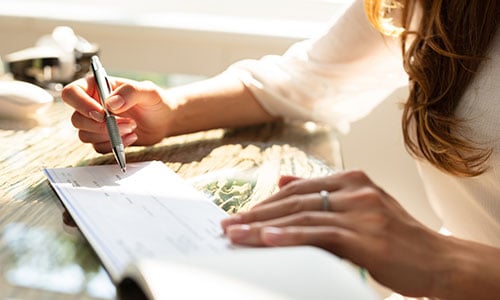
It’s important to understand the differences in checks, and when to use them. As financial responsibility increases, you may find you want the security, peace of mind, and proof that checks offer. These benefits are why checks continue to be the preferred payment method in many transactions.
What is a check?
“A check is a written, dated, and signed instrument that directs a bank to pay a specific sum of money to the bearer. The person or entity writing the check is known as the payor or drawer, while the person to whom the check is written is the payee.”[1]
Checks allow two or more parties to perform a transaction without the use of physical currency. Writing a check is a way to tell a bank to transfer funds from one account to another.
Why are checks useful?
You can use checks to make payments, give as a gift, or transfer money between two entities. They are a secure way to transfer money, since the payee is the only one who can instruct the bank to transfer the funds to their account. If a check is lost or stolen, no one else is able to cash the check.
Types of checks
- Personal Check
A personal check is a check your bank issues that has your routing and account number printed on it. The payor needs to fill out the check, since it is otherwise blank. The payee will then deposit the check in their account, which transfers funds to the recipient. - Certified Check
A certified check verifies that there are enough funds in the drawer’s account to honor the amount of the check. This means that the check is guaranteed not to bounce due to insufficient funds. A check can be certified at the bank from which it is drawn. - Cashier's Check
A bank guarantees these types of checks. A cashier signs the check, which makes the bank responsible for the funds. A cashier’s check is generally required in large transactions, such as buying a car or house. Most banks and credit unions will charge a check fee for cashier’s checks. - Payroll Check
A payroll check is another example of a type of check, however, it is issued by an employer to compensate for the employee’s work. Direct deposit and other forms of electronic transfers have overtaken the traditional, physical paycheck. - Bounced Check
As mentioned before, a check has the ability to bounce if a bank has not guaranteed it. This means the payor wrote a check for an amount larger than what is in their account. The payor has non-sufficient funds (NSF), and will likely incur a fee for attempting to overdraw on the account. - Voided Check
A voided check is a paper check that has the word "VOID" written across the front of it. - Money Order
A money order is a secure form of payment, representing an amount of money. You will pay the full amount of the check, plus a small fee when you purchase it. Unlike checks, a money order is not directly pulled from your account. They are useful if you may not want to use a personal check which includes personal information.
How to order more checks
So, you’ve gotten used to filling out your checks, and you’ve finished your stack. If you’re in need of more checks, you can visit a local branch or order more using our website or mobile banking app. Online Banking customers can order checks in just a few minutes either on our secure website or through our Mobile Banking app.
On our secure website (mobile and desktop):
- Sign into your Online Banking Account
- Select the "Additional Services" tab in the main navigation
- Click the "Order Checks" link and follow the instructions
Not an Online Banking customer? Enroll in Online Banking today
On our mobile app:
- Sign into the mobile app
- Navigate to your checking or savings account
- Open the app navigation menu
- Select the "Additional Services" tab
- Click the "Order Checks" link and follow the instructions
Don't have our mobile app? Download it today
Have additional questions about checks? We’re here to help. Visit your local Central Bank branch or contact us.
Source:
[1] Check, Investopedia